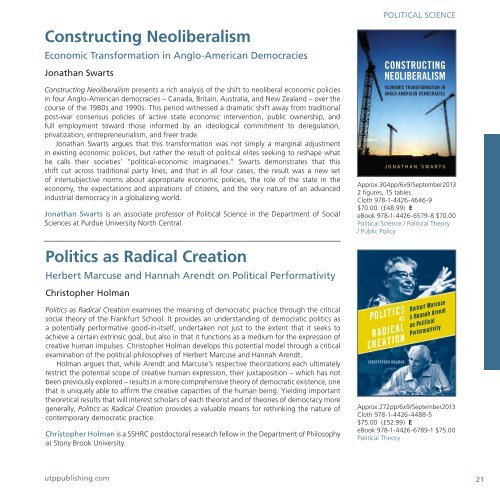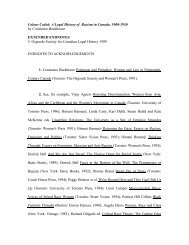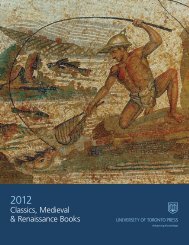FALL-WINTER 2013 - University of Toronto Press Publishing
FALL-WINTER 2013 - University of Toronto Press Publishing
FALL-WINTER 2013 - University of Toronto Press Publishing
You also want an ePaper? Increase the reach of your titles
YUMPU automatically turns print PDFs into web optimized ePapers that Google loves.
Constructing NeoliberalismEconomic Transformation in Anglo-American DemocraciesJonathan SwartsConstructing Neoliberalism presents a rich analysis <strong>of</strong> the shift to neoliberal economic policiesin four Anglo-American democracies – Canada, Britain, Australia, and New Zealand – over thecourse <strong>of</strong> the 1980s and 1990s. This period witnessed a dramatic shift away from traditionalpost-war consensus policies <strong>of</strong> active state economic intervention, public ownership, andfull employment toward those informed by an ideological commitment to deregulation,privatization, entrepreneurialism, and freer trade.Jonathan Swarts argues that this transformation was not simply a marginal adjustmentin existing economic policies, but rather the result <strong>of</strong> political elites seeking to reshape whathe calls their societies’ “political-economic imaginaries.” Swarts demonstrates that thisshift cut across traditional party lines, and that in all four cases, the result was a new set<strong>of</strong> intersubjective norms about appropriate economic policies, the role <strong>of</strong> the state in theeconomy, the expectations and aspirations <strong>of</strong> citizens, and the very nature <strong>of</strong> an advancedindustrial democracy in a globalizing world.Jonathan Swarts is an associate pr<strong>of</strong>essor <strong>of</strong> Political Science in the Department <strong>of</strong> SocialSciences at Purdue <strong>University</strong> North Central.POLITICAL SCIENCECONSTRUCTINGNEOLIBERALISMECONOMIC TRANSFORMATION INANGLO-AMERICAN DEMOCRACIESJONATHAN SWARTSApprox. 304 pp / 6 x 9 / September <strong>2013</strong>2 figures, 15 tablesCloth 978-1-4426-4646-9$70.00 (£48.99) EeBook 978-1-4426-6579-8 $70.00Political Science / Political Theory/ Public PolicyPolitics as Radical CreationHerbert Marcuse and Hannah Arendt on Political PerformativityChristopher HolmanPolitics as Radical Creation examines the meaning <strong>of</strong> democratic practice through the criticalsocial theory <strong>of</strong> the Frankfurt School. It provides an understanding <strong>of</strong> democratic politics asa potentially performative good-in-itself, undertaken not just to the extent that it seeks toachieve a certain extrinsic goal, but also in that it functions as a medium for the expression <strong>of</strong>creative human impulses. Christopher Holman develops this potential model through a criticalexamination <strong>of</strong> the political philosophies <strong>of</strong> Herbert Marcuse and Hannah Arendt.Holman argues that, while Arendt and Marcuse’s respective theorizations each ultimatelyrestrict the potential scope <strong>of</strong> creative human expression, their juxtaposition – which has notbeen previously explored – results in a more comprehensive theory <strong>of</strong> democratic existence, onethat is uniquely able to affirm the creative capacities <strong>of</strong> the human being. Yielding importanttheoretical results that will interest scholars <strong>of</strong> each theorist and <strong>of</strong> theories <strong>of</strong> democracy moregenerally, Politics as Radical Creation provides a valuable means for rethinking the nature <strong>of</strong>contemporary democratic practice.Christopher Holman is a SSHRC postdoctoral research fellow in the Department <strong>of</strong> Philosophyat Stony Brook <strong>University</strong>.CHRISTOPHER HOLMANHerbert Marcuse& Hannah Arendton PoliticalPerformativityApprox. 272 pp / 6 x 9 / September <strong>2013</strong>Cloth 978-1-4426-4488-5$75.00 (£52.99) EeBook 978-1-4426-6789-1 $75.00Political Theoryutppublishing.com21
















